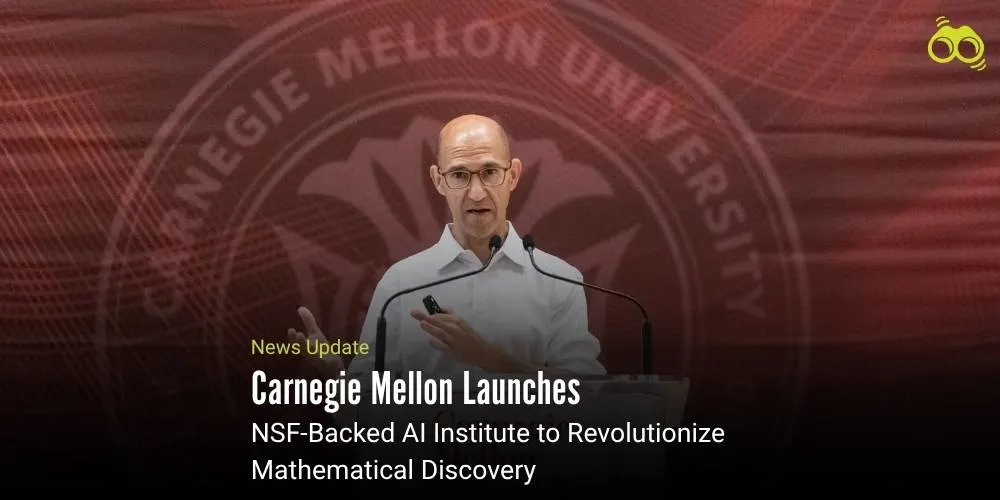New CMU Institute Harnesses AI to Transform Mathematical Research Across Disciplines
AI Meets Mathematics: Carnegie Mellon Unveils ICARM to Tackle Global Challenges
Artificial Intelligence (AI) is rapidly reshaping higher education, with universities across the globe integrating AI into teaching, research, and institutional operations. From personalised learning platforms to predictive analytics and intelligent tutoring systems, AI is helping institutions enhance student outcomes, streamline processes, and address complex global challenges. For example, Harvard University has introduced an AI-powered teaching assistant in its flagship computer science course, offering students round-the-clock support via GPT-4. Likewise, Stanford University has developed predictive AI tools to identify students at risk of underperformance, enabling timely academic interventions. At Georgia Tech, AI is being deployed to strengthen research capabilities across disciplines, while Babson College has launched collaborative AI communities to encourage experimentation and knowledge exchange.
Against this backdrop, Carnegie Mellon University (CMU), a recognised leader in AI research, has established the Institute for Computer-Aided Reasoning in Mathematics (ICARM). Funded by the National Science Foundation (NSF) and supported by the Simons Foundation, ICARM aims to help mathematicians harness AI and formal methods to accelerate and enhance mathematical reasoning. The institute will apply these technologies to real-world challenges in fields such as cybersecurity, finance, space exploration, and healthcare. CMU officials noted that the launch comes at a time when the mathematics community is increasingly adopting new technologies. Theresa Mayer, Vice President for Research, highlighted that AI and machine learning are transforming mathematical research. She expressed gratitude to the NSF for its support and affirmed CMU’s commitment to advancing the field through interdisciplinary collaboration and innovative discovery methods.
Machine learning, they explained, is particularly effective in uncovering hidden mathematical patterns, which can be applied in areas such as drug discovery and financial forecasting. Meanwhile, formal methods and automated reasoning play a critical role in ensuring software reliability and correctness. Professor Jeremy Avigad, Director of ICARM, stated that the institute would focus on how emerging technologies can support mathematical reasoning and improve various types of calculations. In addition to research, ICARM will host summer schools, workshops, and conferences to train others in applying these tools within mathematics.
Prasad Tetali, Head of the Mathematical Sciences Department at CMU, expressed optimism that the technologies developed by ICARM could also enhance mathematics education in schools and universities. While the primary focus remains research, he believes the educational benefits will be substantial. Tetali further explained that mathematical reasoning underpins many areas of science and engineering. He emphasised that when human insight is combined with machine support, the possibilities for innovation become vast. He added that investment in fundamental research often yields unexpected and far-reaching rewards, and he sees strong potential for significant discoveries across multiple domains of mathematics.
The institute will operate as a three-year pilot project, bringing together researchers from CMU’s Mellon College of Science and School of Computer Science. The core team includes Irina Gheorghiciuc, Michael Young, Marijn Heule, and Sean Welleck, working in collaboration with researchers from the University of South Carolina and Georgia Gwinnett College. According to the National Science Foundation, ICARM will enable researchers to explore new frontiers in mathematics. Professor Avigad remarked that the launch reflects strong institutional and national support, and the team is honoured and committed to fulfilling the institute’s ambitious goals. By combining traditional mathematical insight with cutting-edge AI, ICARM is poised to redefine how complex problems are understood and solved.
Editor’s Note:
As artificial intelligence continues to permeate the global education landscape, universities are increasingly embracing its transformative potential across teaching, research, and institutional strategy. From adaptive learning platforms and intelligent tutoring systems to predictive analytics and automated reasoning, AI is reshaping how knowledge is delivered, assessed, and advanced. Carnegie Mellon University's launch of the Institute for Computer-Aided Reasoning in Mathematics (ICARM) represents a significant advancement, aligning with the global movement towards integrating AI into mathematics. This initiative, backed by major research foundations, showcases AI's potential to enhance human reasoning, accelerate discovery, and explore new possibilities in both mathematical research and education, extending beyond its role as a mere teaching aid. Such initiatives underscore a broader shift in higher education, where institutions worldwide are reimagining traditional academic boundaries and investing in interdisciplinary approaches to address complex societal challenges. As AI becomes more embedded in the fabric of university life, from student support to curriculum design and frontier research, its role in shaping the future of education is both profound and far-reaching.
Skoobuzz asserts that deliberate investment in AI-driven research and collaborative efforts should be considered for their potential to enhance academic integrity, expand educational opportunities, and drive innovation across diverse fields.














0 Comments (Please Login To Continue)